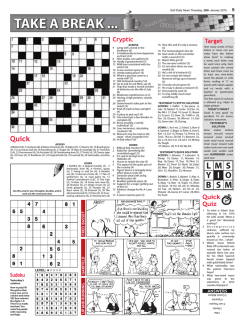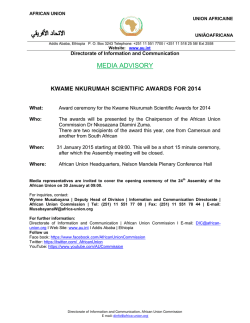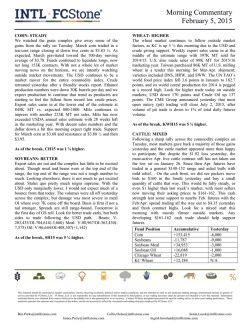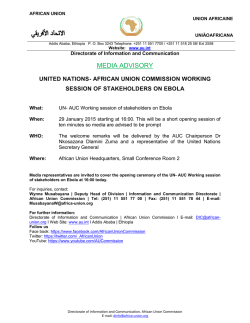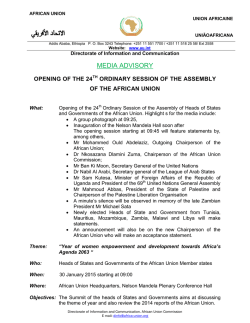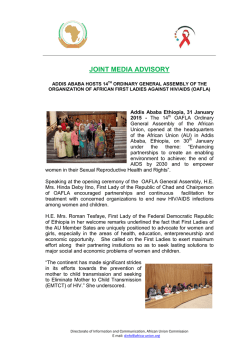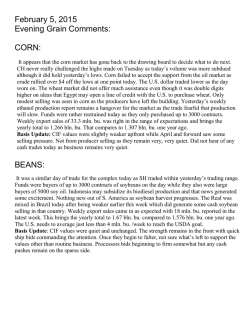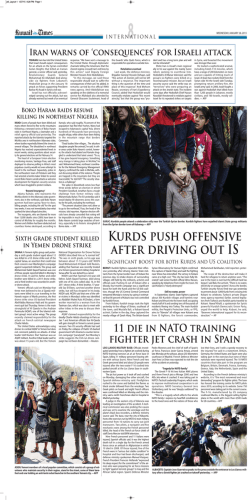
Bad omen as capital spending hal ve s Infrastructure still in
Mexican policy reforms hold important lessons for SA — Ann Bernstein Page 7 BusinessDay Tuesday February 3 2015 FTSE-JSE indices Close 51266.81 45111.03 Top 40 68813.46 Findi 30 Resources 20 42078.15 1513.34 Goldex All Share % ch ▲ ▲ ▲ ▲ ▲ FINAL R20.00 incl VAT ❙ Zim US$3.00 FTSE-JSE all share daily close 0.63 0.76 0.34 2.23 2.38 Déjà vu as AU imitates OAU Page 6 ................................................................................................................................................. MARVIN MEINTJIES Remember to keep sight of all that’s right Page 7 TRUDI MAKHAYA Spazas need to Page 7 adapt to new landscape ................................................................................................................................................. Inside Producers ‘to feel pain of load shedding and strikes’ ACTIVITY in the manufacturing sector improved last month, though load shedding and strikes will weigh on output potential, Manufacturing Circle executive director Coenraad Bezuidenhout said yesterday, after the release of the Kagiso PMI. Employment in the sector is also likely to stay subdued as producers are increasingly using more machines and less labour. Page 2 Selebi case review rejected THE National Prosecuting Authority yesterday poured cold water on attempts to have the case against deceased former police commissioner Jackie Selebi reviewed. Page 3 Limpopo regains its departments T HE Treasury has transferred the five provincial departments it has been running since 2011 back to the Limpopo government. The presence of administrators was the cause of tension with the province. The transfer was made under a memorandum that requires the province to comply with Treasury directives for better financial management. Premier Stan Mathabatha has complained about being a “shadow premier” without full control over his government. There were also complaints about multiple centres of power and a lack of co-ordination. Full report: page 2 Group Five expects earnings drop GROUP Five said yesterday its earnings for the six months ended December could halve due to a slower order intake, contract losses and restructuring costs. Page 10 Coca-Cola outperforms its bottler COCA-Cola shares are outperforming Coca-Cola Enterprises as investors bet earnings will accelerate more for the soft-drink maker than for its international bottler this year. Page 11 Bulls ready for Super Rugby THE Bulls are looking forward to the start of the Super Rugby season in two weeks’ time following their impressive showing in the 39-26 victory over English side Saracens at the weekend. Page 15 Klate eyes prospects at United DAINE Klate, who joined SuperSport United on loan last week, says his move has a lot to do with the opportunities he will have at the club when he retires. Back Page What’s Hot ONLINE ▲ ▲ ▲ ▲ Johannesburg % ch Currencies 0.01 0.93 0.00 0.22 R/$ INET BFA 11.655 17.510 13.162 1.129 117.382 R/£ R/¤ $/¤ ¥/$ Cape Town % ch ▼ ▼ ▼ ▲ ▲ 0.97 0.63 0.62 0.36 0.72 Exports of vehicles built in SA jump 84% Durban Port Elizabeth Commodities Latest % ch 1260.25 1277.70 Gold NY 50.08 Brent Future Platinum PM Fix 1221.00 Palladium Spot 771.50 Gold PM Fix ▼ ▲ ▲ ▼ ▲ Foreign Markets Latest 0.67 1.36 1.93 0.97 0.06 Dow Jones S&P 500 FTSE 100 Nikkei 225 Xetra Dax 17310.43 2010.39 6749.40 17674.39 10694.32 % ch ▼ ▼ ▼ ▲ ▼ 0.61 0.54 0.90 0.39 0.41 Tax the rich Obama’s proposed budget draws battle lines Page 4 US President Barack Obama delivers remarks on the budget for the 2016 fiscal year in Washington yesterday. Mercedes’s C-Class boosts figures DAVID FURLONGER Editor at Large MOTOR companies and banks are split over whether positive economic indicators and tumbling fuel prices are creating a positive environment for domestic newvehicle sales this year. But while they wait to see which way the South African market goes, export sales are already booming. Exports of locally built cars shot up 84.4% last month, compared to January last year. The rise was fuelled partly by Mercedes-Benz SA, which was not exporting — or even building — cars at the beginning of 2014, while it switched over to a new CClass model. Last month it exported 2,479. But it was not the only car maker to improve. Total January-onJanuary car shipments grew from 6,021 to 11,104, helped by a weak rand and the continued recovery in demand in major northern Consumers know this fuel-price honeymoon can’t last hemisphere markets. The same could not be said of light commercial (mainly bakkie) exports, which tumbled 28% — from 7,732 to 5,578 — according to figures compiled by the National Association of Automobile Manufacturers of SA (Naamsa). Toyota SA president Johan van Zyl said yesterday the fall might not be short-term. Most South African bakkie exports were to other African countries, some of which had changed their policies on vehicle imports. Algeria, a major South African customer, had curtailed government support for companies buying commercial vehicles, while Nigeria was raising import duties as it began to create its own motor industry. Algeria and Nigeria were hit hard by falling oil prices. As in Angola, the loss of oil revenue was prompting them to cut government spending budgets. Dr van Zyl, who heads the global Toyota group’s African division, said other African countries were cutting imported vehicle orders in expectation of currency depreciation. As a result, combined exports of all new vehicles grew 20.7%, from 13,845 to 16,708. Naamsa predicts the full-year figure will reach at least 320,000, a 15% improvement on 2014’s 276,404. In the domestic market, total new-vehicle sales last month were down 1.2%, from 52,948 to 52,306. Light commercials were up 6% but cars dipped 3.6%. Medium commercials fell but heavy trucks continued to grow. Given that January was effectively half a sales month after the Christmas holidays, analysts pointed out yesterday that it was too early to draw conclusions. But Naamsa director Nico Vermeulen said this week’s release of the latest purchasing managers’ index, indicating an improvement in business conditions in the factory sector, was a positive sign for vehicle sales in the short to medium term. The Reserve Bank’s leading indicator for November, implying better economic growth and lower inflation in the next few months, was added cause for hope. Mr Vermeulen suggested the continued drop in fuel prices would benefit the market. But Nicholas Nkosi, head of vehicle and asset finance at Standard Bank, did not share his optimism. “I think the extra disposable income resulting from fuel prices will benefit the used-car market, which I think will show a strong performance in 2015. Newcar prices will still be driven by the weak rand.” Simphiwe Nghona, executive head of WesBank’s motor division, doubted that South African consumers would be seduced into buying new cars by lower fuel prices. “When you buy a car, you buy into a long-term contract,” he said. “Consumers know this fuelprice honeymoon can’t last indefinitely.” Still, he and Mr Nkosi agreed with Mr Vermeulen that economic conditions were generally favourable for the market — particularly now that interest rates seemed set for further stability. However, they said there were no market signals yet to back up Mr Vermeulen’s view that proposed changes to fringe benefits tax on company cars, due to take effect on March 1, would lead to pre-emptive buying this month. Investec said yesterday that high household debt and low consumer confidence would continue to “curtail consumers’ ability and willingness to spend”. [email protected] Picture: EPA, KRISTOFFER TRIPPLAAR SAB wins decade-long distribution case again NICK HEDLEY Industrial Writer THE Competition Commission’s decade-long distribution case against brewer SAB has been thwarted once again, this time by the Competition Appeal Court. The commission’s appeal was dismissed with costs in a judgment handed down in Cape Town yesterday, meaning its last option would be an appeal at the Constitutional Court. Competition commissioner Thembinkosi Bonakele said “we haven’t decided yet” whether or not to refer the case to SA’s highest court. The Competition Commission was appealing against the Competition Tribunal’s decision last year not to abolish SAB’s exclusive territorial agreements with its 13 appointed distributors. While 90% of SAB’s distribution is done through its own depots, the remaining 10% is done through appointed distributors across the country. This portion has been under the spotlight since a complaint was made by an independent liquor distributor in 2004. Long delays followed the referral of the case in 2007 to the tribunal, mainly due to procedural challenges put up by SAB. Its first successful attempt to get the case dismissed was put on ice when the commission appealed to the tribunal. When the Lawyers hired to probe SAA CEO Chairwoman refuses to specify charges ANDISWA MAQUTU Transport Writer LAW firm ENS has been retained by South African Airways (SAA) to investigate unspecified charges against its CEO, Monwabisi Kalawe, according to SAA chairwoman Dudu Myeni. Mr Kalawe has been suspended for the past three months. SAA was still not able to say publicly what Mr Kalawe had been accused of, or was being investigated for, because the matter was “very sensitive”, Ms Myeni said in an interview last week. The Treasury, the airline’s new shareholder, has demanded SAA straighten out its prolonged governance problems as part of an agreement it reached with the airline in order to give it a guarantee of R6.5bn. The Treasury intends to appoint a new board before the end of next month to replace the four-member interim board. The interim board was installed as an emergency measure after several members of the former board resigned. Ms Myeni and her close ally Yakhe Kwinana remained after the last board collapsed. The other two members of the interim board are Anthony Dixon, an accountant, and aviation specialist John Tambi, both appointed by Public Enterprises Minister Lynne Brown. Ms Myeni and Ms Kwinana were cited in a letter signed by six of the former board’s independent directors as being the reason Continued on page 2 Editorial: page 6 www.bdlive.co.za Most read 1 Gareth van Onselen: SA burns as Zuma misleads in Davos 2 ANC opts to keep Eskom in one piece 3 Songezo Zibi: Talk is cheap and improbable conspiracies abound 4 Anthony Butler: SA taking on banana republic practices 5 Ebrahim Harvey: Creating leftist alternative to ANC could prove a tall order 6 Harald Winkler: A dystopian arms tale of the Kingdom of ZA For advertising call Eben Gewers on: 082 374 6287 e-mail [email protected] 021 488 1786 For BDFM subscriptions, website queries or for technical support please call: 0860 26 26 26 INET BFA 7.05 6.49 R207 3-mth NCD spot 6.18 11.876 R/$ (6-mth) R/$ (12-mth) n/a R186 GREAT READS EDITORIAL OPINION Bonds/forwards www.bdlive.co.za Strauss-Kahn goes on trial for pimping FOREIGN STAFF Lille FORMER International Monetary Fund chief Dominique Strauss-Kahn went on trial yesterday on charges of pimping, four years after a sex scandal cost him his job and a shot at the French presidency. The disgraced 65-year-old economist found himself back in the dock — this time in the northern French city of Lille — accused of being at the centre of a vice ring that hired prostitutes for sex parties in Brussels, Paris and Washington. He settled a 2011 case of alleged sexual assault of a hotel maid in New York. Mr Strauss-Kahn appeared on edge as presiding Judge Bernard Lemaire read out the charges against him and 13 co-accused, a colourful cast of characters including luxury hotel managers, a former police commissioner, and a brothel owner nicknamed “Dodo the Pimp”. Lurid details of group sex and high-end prostitution are likely to emerge in the trial for “aggravated pimping in an organised group”, a charge punishable by up to 10 years in prison and a fine of up to €1.5m. Prostitution is legal in France but procuring, the legal term for pimping which includes IN THE DOCK: Dominique Strauss-Kahn is on trial four years after a sex scandal cost him his IMF job. Picture: REUTERS encouraging, benefiting from or organising prostitution, is punishable with jail time. The crux of the case is whether Mr StraussKahn knew the women lavishing their attention on him were prostitutes and whether he had a role in organising their presence. Mr Strauss-Kahn admits to being a “libertine” who enjoys orgies but has steadfastly denied knowing the women were paid. “In these circumstances one isn’t always clothed, and I challenge you to tell the difference between a prostitute naked and any other woman naked,” his lawyer Henri Leclerc said in 2011. But even prosecutors have been divided over whether Mr Strauss-Kahn was more pimp than casual consumer. In 2013 state prosecutor Frederic Fevre called for the charges to be dropped, but investigating judges overruled him. AFP case’s dismissal was upheld by the tribunal, the commission took the next step in the process by turning to the Competition Appeal Court. Lara Granville, a director at law firm Norton Rose Fulbright, which represented the appointed distributors, said the decision provided “welcome clarity for dominant firms in SA regarding how they choose to structure their distribution”. She said there had been, until now, uncertainty about how competition law should view a company that distributed its own product and also appointed external distributors. “The issue was whether that raises price-fixing or market allocation concerns. The Competition Appeal Court has now clarified that these arrangements need not be considered as automatically illegal.” The Competition Appeal Court found that the commission had failed to prove that SAB’s distribution arrangements were anticompetitive in that they inflated prices or reduced service levels. The commission’s case is based on price discrimination, market allocation and retail price maintenance. The commission has argued that SAB had appointed distributors and given them exclusive territories in which to distribute its products‚ thus restricting competition between the various appointed distributors. [email protected]
© Copyright 2026
